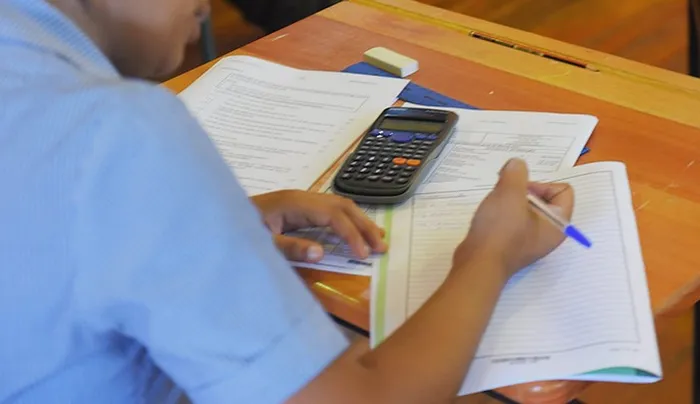Why education in KwaZulu-Natal is failing our children
Where has the money gone?

The fact that we have schools does not guarantee that quality education is being provided, says the writer.
Image: File
VIMOLAN MUDALY explores the alarming state of education in KwaZulu-Natal, highlighting the challenges posed by budget cuts, lack of resources, and the impact on pupils' learning. He questions the accountability of the Department of Basic Education and the implications for the future of South Africa's youth.
I AM CONSTANTLY reminded of the adage: “Every child has the right to an education."
Although simple, it clearly articulates the fundamental right of children to access education. Beyond the idea of simply providing education, the quality of education in KwaZulu-Natal needs to be questioned.
If just half of the allegations made by SADTU are partially true, then our children are in serious trouble. Everyone should be concerned.
The fact that we have schools does not guarantee that quality education is being provided. Many of our schools have been barely managing to survive over the last few years, both financially and in terms of teaching and learning.
Absent or insufficient infrastructure, lack of teaching resources, and no clean drinking water or proper ablution facilities have been major hindrances to the high-quality education we would expect from a well-functioning education system. Lack of one or more of the listed resources reduces the learner’s ability to manoeuvre successfully towards becoming competent in a rapidly evolving society.
There might be a perfectly good explanation for their actions, but the KZN Department of Basic Education ought to let the public know. Why has the basic funding allocation for the different schools decreased? Schools are, most often, not able to collect school fees. How do they then ensure that the basic needs of the school are met?
That money belongs to the school, and any unilateral decision taken that negatively affects the school should be justified publicly.
The more important question is: where has the money gone? Is it related to corruption? But it is fallacious to believe that education is completely free, especially for the truly indigent families in the country. Uniform, transport, food, and stationery costs are exorbitant. To be further burdened by the fact that there are fewer teachers in a school, with far fewer resources, makes schooling untenable.
The children most affected are those in quintile 1 to 3 schools because their parents would themselves require financial assistance. So, all that the system is doing is that it punishes the poor and suppresses the creative spirit of these children, who may have the potential to become high achievers. We are designing a system that will ensure that the indigent are deprived of knowledge.
Knowledge deprivation is generally a problem associated with family and community background, geographical issues, and socioeconomic factors. The dimension playing out in South Africa may be purely political. Here, it seems, the provincial government has unilaterally imposed budget cuts that would directly influence the quality of education, even though it is common knowledge that education in South Africa might be among the poorest in the world.
The actions of the department must be questioned because of the concomitant effects it has on the pupils’ learning for understanding, their future economic productivity, social mobility, and, of course, the country’s political stability.
SADTU has decided that it will react to these “unilateral decisions”.
SADTU has been a strong ally of the ANC over the years, and I’m wondering what has drawn them out to protest so vociferously? I agree that the protests are necessary, but I’m wondering if there is something more sinister yet to come because some of the grievances raised by SADTU have been serious issues previously. For example, many schools have had no money to procure teaching and learning support resources for a number of years already.
The actions of the department and the protests by SADTU will impact teaching and learning. Of the many factors that influence progress at a school, time in class must rank among the top three, after teacher knowledge and pedagogy,
and learner cognition. Although it is examination season, much learning occurs through such assessments. Teachers determine what their learners know or what knowledge is scarce. Teaching is then adapted accordingly. Learners get the opportunity to go through the semester’s work, and they can also determine where their knowledge gaps are located. In the absence of examinations and standardised tests, the potential for learning is reduced.
So, we can all wish that the department finds the funds and returns them to where they belong. We would want the amounts allocated to increase and not decrease, as is the case now. Educationists know that you cannot make a child learn. You can only provide the right environment for learning to occur.
This constructivist perspective propagates the idea that all learning requires the right conditions for the child to develop ideas and concepts themselves. How are the actions of both the Department of Education and SADTU contributing to the educational development of the child?
Sometimes, one needs to wonder where this poverty of knowledge lies. Providing the child with the ideal environment for learning is the responsibility of everyone, but the obligation of the Department of Basic Education cannot be underplayed, because the money was allocated in specific ways. They have to ensure that they restore the budgetary allocations asap. I sense that no one really cares.

Vimolan Mudaly
Image: File
Vimolan Mudaly is a professor at the University of KwaZulu-Natal
** The views expressed do not necessarily reflect the views of IOL or Independent Media.
Related Topics: